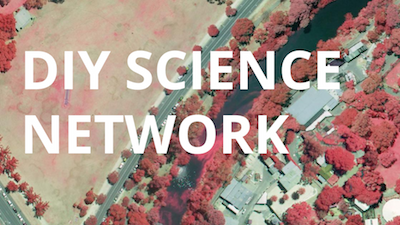I’d like to propose a session around a recent new project – the DIY Science Network – with a lot of parallels with Opencare. It would be great to connect these efforts where it makes sense.
I’m one of the volunteer organisers of a community of science hackers in Berlin. Since 2013 we’ve been running a local edition of the hackathon Science Hack Day which brings together scientists, artists, designers, engineers, developers and other enthusiasts with an open brief to collaborate, ideate and hack together. We’ve grown a really amazing community of passionate and talented interdisciplinary folks and we’d love to be able to develop some more ambitious civic or cultural projects. But we’re already at the limit of what we can achieve as volunteers. It’s a classic Catch 22 volunteer trap – we need money to buy us more time, but we don’t have enough time to work on finding money.
THE PROBLEM
From talking to friends in the wider network of DIY and community-based science projects (many related to issues of care) it seems this is a very common problem. From diybio community labs and bioart collectives, to civic environmental monitoring projects, to patient activism groups, to interdisciplinary science hacking communities — we all face similar challenges in growing and maintaining ourselves as sustainable civil society initiatives.
Finding the right balance to sustain a healthy community, share knowledge, and support co-creation is hard. And funding around grassroots citizen science can be particularly challenging, if not unfair: researchers that study us receive more funding than we do ourselves. And, whilst large amounts of public science funding are allocated to ‘citizen science’ at the both European and National levels, there is very little possibility for non-institutional citizen science communities to access it.
JOINING FORCES: THE DIY SCIENCE NETWORK
The DIY Science Network has grown out of a number of conversations around these topics. We exploded into existence last autumn fueled by some rather difficult and inequitable interactions with institutional partners, but are now focussed on channeling our energy into positive action. It is a meta network between DIY science initiatives: part ‘P2P: sharing best practices’ and part ‘advocacy for access to public research funding’. So far most of the work we’ve done has been about growing the network and finding our identity.

OUR PROGRESS
We took part in the Mozilla Global Sprint earlier this month with a focus on the P2P side of the project. However, for now we think the priority should really be to get an advocacy platform up and running as soon as possible in the hope that we might still be able to have some influence on agenda setting for FP9. In the short term we hope soon to secure funding to gather 4-5 European community/project organisers together for a co-design sprint to lay the foundation for the network – describe our identity, values, mission, begin to craft our advocacy arguments and roadmap next steps – and build a basic website.
At openvillage, we would like to keep our focus on the advocacy side of the project:
MAIN CHALLENGE
How do we encourage funders to support DIY science initiatives now? And, longer term, how can we foster a funding culture that is supportive of non-institutional science?
QUESTIONS TO ADDRESS
- What kind of funding do we need? (fellowships? core funding? project funding?) and how much?
- There is a lot of perceived risk in funding non-institutional projects, especially at the European level where so many stakeholders are involved. How to we allay those fears? What about ethics committees, scientific advisory boards, financial controlling...?
- How can the impact of our projects be evaluated?
- Does it make sense to work with intermediary organisations (fiscal sponsors) who manage the distribution of smaller funds (Individual DIY science initiatives are not usually looking for EC-scale funding budgets - think €1000s or €10 000s rather than €100 000s or €millions.), provide training/project co-design, mitigating risk for the funding bodies?
- Is public funding even the way to go? E.g. Would be we better off concentrating on changing the culture of science-funding foundations to encourage them to support DIY science? Should we be working on developing our own business models? ...
As yet we don’t have a clear idea for a format for openvillage - it will depend on what stage we are at by the time of the festival. But in general, we are very open to talk about how to bring in this topic in the most constructive way possible for everyone.